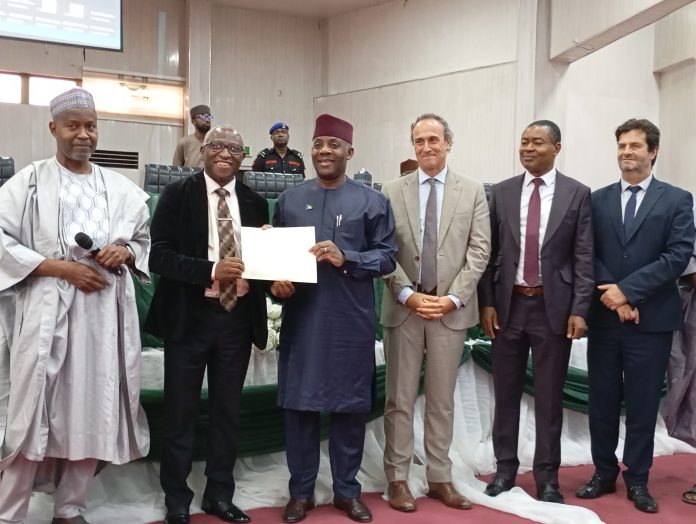The Federal Government has secured a $40 million grant from the French Development Agency, AFD, to develop Information and Communication Technology, ICT, infrastructure across 10 federal universities.
Unveiling the initiative in Abuja on Tuesday, the Minister of Education, Dr. Tunji Alausa, said the project, titled Blueprint ICT Development, is a strategic step towards digitising Nigeria’s tertiary education system.
“This is more than just infrastructure. It’s an investment in smart campuses, smart people, and smart ideas,” Alausa said.
The minister noted that the initiative aligns with President Bola Tinubu’s Renewed Hope Agenda and reflects a renewed national focus on human capital development, digital innovation, and inclusive education.
According to him, the project will support the digital transformation of university operations, including digitisation of administrative functions, development of hybrid and transnational academic programmes, and the integration of institutions into the Nigerian Research and Education Network, NgREN.
He said the project will also strengthen digital libraries, research management systems, and promote teacher training, education data systems, and the mainstreaming of Technical and Vocational Education and Training, TVET, into university curricula to advance skills-based learning.
Also speaking, the French Ambassador to Nigeria, Mr. Marc Fonbaustier, reaffirmed France’s commitment to supporting Nigeria’s drive for inclusive and sustainable development, particularly through the revitalisation of its university education system.
Fonbaustier described the $40 million initiative as a bold and transformative national effort to modernise teaching and learning through digital innovation.
“This event marks more than the unveiling of a strategic programme—it is a symbol of France’s enduring partnership with Nigeria.
“We commend the Federal Ministry of Education, the National Universities Commission, and the selected universities for their vision, discipline, and collective resolve,” he said.
The project, funded by the French Development Agency, AFD, is a critical component of the broader Blueprint for the Rapid Revitalization of University Education in Nigeria developed by the National Universities Commission, NUC, in 2018.
Due to limited domestic funds, implementation is beginning with the ICT component, with AFD committing a $40 million grant to support it.
Fonbaustier stated that the initiative goes beyond infrastructure as it would have a long-term impact on systems, governance, and human capital.
“Ten leading federal universities have been selected as pilot institutions, and these campuses will become living laboratories for 21st-century education. They will invest in modern infrastructure, enhance connectivity, and drive pedagogical innovation—offering tools for both teachers and students to compete globally,” he said.
Fonbaustier stressed that the project’s focus extends beyond digital tools, encompassing institutional reforms, planning, monitoring and evaluation, and leadership development.
“The Blueprint ICT-Dev Project is not just about installing digital tools. It is about building systems, nurturing leadership, and strengthening institutional accountability. True development comes from capability, not just infrastructure,” he said.
“This project lays the foundation for stronger ties with French higher education institutions. France believes in Nigeria’s potential and stands as a partner and friend on this transformative journey,” Fonbaustier said.
The selected universities under this phase include University of Ibadan, University of Calabar, University of Nigeria Nsukka, Federal University of Technology Minna, University of Maiduguri, Bayero University Kano, Modibbo Adama University Yola, Obafemi Awolowo University Ile-Ife, Nnamdi Azikiwe University Awka, and the University of Jos.
On his part, Executive Secretary of NUC, Prof. Abdullahi Ribadu, described the project as a significant milestone in the Commission’s 2018 blueprint for revitalising the Nigerian University System, NUS.
“The project embodies our readiness to embrace digital transformation as a core driver of academic excellence,” Ribadu said.
He emphasised that its success would be measured not only by infrastructure development but by the transformative impact on students, staff, and university communities.
Ribadu further explained that the initiative seeks to bridge the digital divide by extending university reach into underserved areas through open and distance learning programmes, digital literacy campaigns, and teacher empowerment efforts.
Earlier, the Coordinator of Special Projects at NUC, Dr. Joshua Atah, provided further details, revealing that the first component of the project, valued at $38 million, will focus on overhauling ICT systems in the 10 beneficiary universities.
Atah added that this includes improving digital infrastructure, enhancing connectivity, training lecturers in modern pedagogy, and providing e-learning resources.
According to him, the second component, with a $2 million allocation, will support the development of a National STEM Transformation Strategy.
This component will fund labour market studies, awareness initiatives, pilot STEM education programmes, and the creation of a national steering committee.



